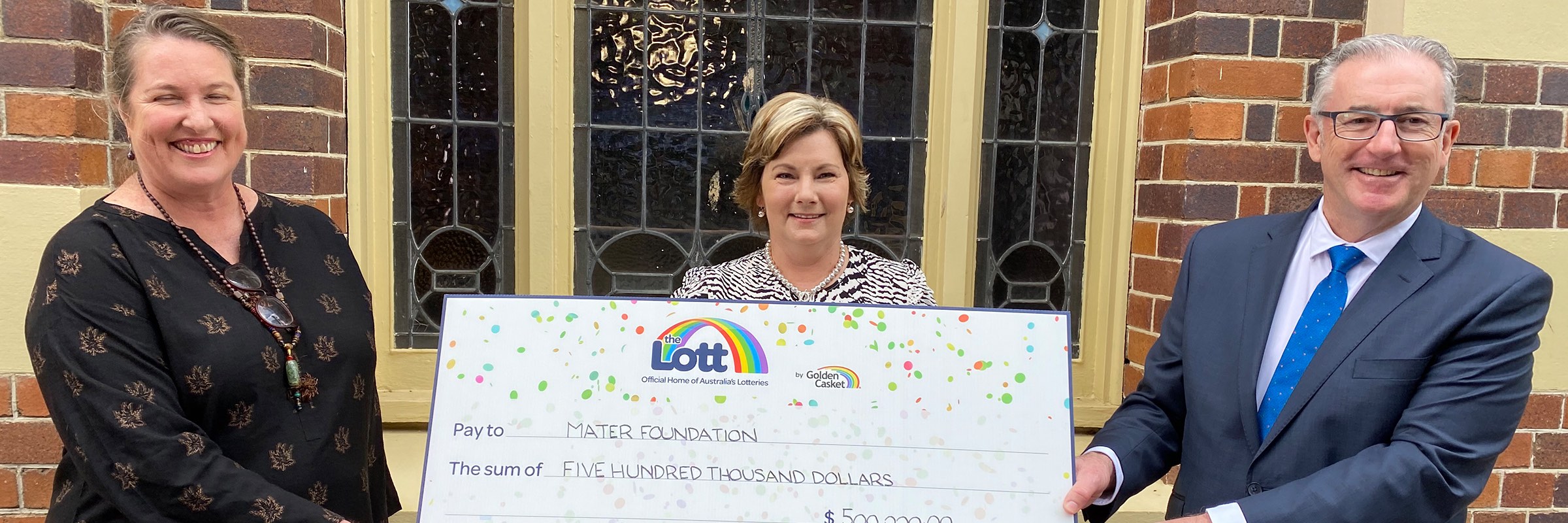Mater investigates impacts of COVID-19 on Queensland babies, supported by Golden Casket
A Queensland-first trial that will assess the impacts of COVID-19 on expectant parents and their unborn babies is being carried out at Mater Mothers’ Hospitals, supported by a $500 000 donation from the Lott via Golden Casket.
Forming part of the Queensland Family Cohort Study which is already underway, a research team at Mater are in the process of recruiting 300 families who have endured the stress brought on by the COVID-19 crisis, while being pregnant.
Mater Research Professor Vicki Clifton said it was important to capture data from both expectant mothers and fathers during this once-in-a-lifetime pandemic to see what the impacts of the crisis were on families, the pregnancy and their babies as they developed.
“We know from previous research undertaken at Mater on the impacts of the 2011 floods that you don’t need to be directly affected by a crisis to have increased stress hormones in your system.
“We know from this study that this affects the placenta and there is a change in the developmental profiles of the baby.
“Many families we have recruited during the pandemic are experiencing stress, whether that’s financial strain due to losing their jobs, or emotional stress, as they are uncertain about the future.
“It’s important that while we have, and continue to experience a pandemic, that we are evaluating the impacts on these families and also how this will influence their babies’ development up until they are school age,” Professor Clifton said.
The Queensland Family Cohort Study pilot began in 2018 with the aim to address disease at its core and determine how a baby’s health and exposure in early life influences the onset of disease in the future.
To achieve this, Professor Clifton’s team assess the physical and mental health of families and collect biological information from samples throughout pregnancy and at birth.
Professor Clifton said the data collected from the families impacted by COVID-19 would be compared to those recruited prior to the pandemic.
“Comparing data across both cohorts gives us a clearer picture of the true impact of the pandemic.
“We already know from data captured prior to COVID that some parents often have a high level of anxiety and depression for a number of reasons, so we want to know how the pandemic adds to the stress that families generally experience.
“We hope the data captured helps to change clinical practice as well as social support for families in the future where we can better identify kids at risk and provide them the support they need, especially before they start school.”
Now 26 weeks pregnant, Claudia Hoch is expecting her second baby boy at Mater Private Hospital Brisbane in September.
She signed up to the study, realising the importance of collecting data during her pregnancy, in particular during a pandemic situation.
“This pregnancy has been very different to my first as I’ve experienced more anxiety due to COVID-19,” she said.
“I know they say that pregnant women have a low risk of catching the virus, however you don’t want to take any risks.
“I wasn’t sure if I should send my son to daycare or not. It’s been an unsettling time for us all.”
Mrs Hoch said with her background in public health, the Family Cohort Study was an important research project to be involved in.
“Looking at the environment of both parents during pregnancy and how this may impact their unborn child is an interesting concept that needs exploring, in particular through a pandemic as we just don’t know what the impacts are on the unborn child and their development,” she said.
The team are also looking to recruit an additional 100 families from an Indigenous background to take part in the study.
Professor Clifton thanked the Lott and Golden Casket for its support of the project and many other important studies currently underway at Mater.
“It’s support like this from Golden Casket that allows us to pursue this necessary research which has the capability of improving outcomes for families across the country,” she said.
The Lott Managing Director Sue van der Merwe said the research would provide invaluable insights to support the future health and wellbeing of Queensland families.
“The start of 2020 has been incredibly disruptive and unpredictable for Queenslanders, but through the work of Professor Clifton and her team, learnings from this unprecedented time can help bolster the services and support families receive in the future,” she said.
“Lotteries first began in Queensland more than a century ago to help provide health facilities to Queenslanders. By supporting research such as this, our commitment through Golden Casket continues to this day.
“During the past 29 years, Golden Casket has provided $14.5 million to Mater’s research programs, which improve the health of Queenslanders at all stages of their lives. More than ever before, this investment in health research has never felt more crucial and beneficial.”
